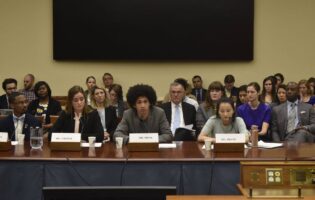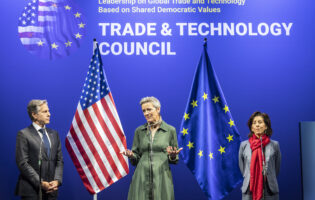Tri-Regional Partnering on Reconciliation in East Asia: Pivotal to Shaping the Order of the Twenty-First Century?

Martina Timmermann
Dr. Martina Timmermann was a DAAD/AICGS Research Fellow in 2014.
While at AICGS, Dr. Timmermann explored the potential and options for EU/German involvement as a mediator in East Asia. One of the major underlying currents impeding a sustainable solution of the several conflicts in the South and East China Sea has been the unsolved WWII history among Japan, China, and the Koreas. It is in this field of WWII reconciliation where Germany might play a particularly positive role. Still, would EU/German mediation be wanted by the various stakeholders involved? What would their expectations be? Dr. Timmermann interviewed key stakeholders in DC to gain a comprehensive and independent insight into their perceptions and expectations in order to develop a set of policy recommendations on how to proceed toward a solution with a peaceful win/win for all.
Dr. Timmermann did her research based on her professional experience at German, Japanese, and American universities and think tanks, the UN, and the corporate sector.
Since 2008, Dr. Timmermann has been Vice President for International Affairs at the Transition and Integration Management Agency (TIMA, established in 1996). TIMA is considered a vanguard consultancy that has made its mark in Euro-Asian business ventures and political projects where integrity, transparency, and ethics are vital for success.
Before joining the corporate sector, Dr. Timmermann served as Director of Studies on Human Rights and Ethics in the Peace and Governance Program at the United Nations University (UNU) Headquarters in Tokyo and as UNU Advisor at UNU-EHS (Environment and Human Security) in Bonn. In that capacity, Dr. Timmermann worked and published on issues of peace and governance, regionalization, public private partnership, sustainability, and human rights, with a continuous focus on Asia and Europe.
Prior to joining UNU, Dr. Timmermann directed a research project on regional identity-building in Southeast Asia and Japan. The project was awarded to her by the German Research Association (DFG) in 1999 and conducted at the Institute of Asian Affairs in Hamburg from 2000-2003. From 1994-1999, Dr. Timmermann was lecturer and assistant professor at the department for International Relations and Foreign Policy at the University of Trier with a focus on Japanese foreign policy. Throughout such years, she also served as president of the “Mittelbau” at the senate of the University of Trier.
In 1998, Dr. Timmermann received her doctorate degree from Ruhr-University Bochum for a study in comparative politics, titled The Power of Collective Thought Patterns: Values, Change and Political Culture in Japan and the United States of America (Leske & Budrich 2000, in German). Her PhD research, which she conducted at Hitotsubashi University in Tokyo from 1993-1994 and at Harvard University’s U.S.-Japan Program and Reischauer Institute in summer 1995, was kindly funded by the Japanese-European Special Exchange Program (SEP), the so-called Takeshita-Initiative.
Some major publications related to Europe and Japan:
Martina Timmermann and Jitsuo Tsuchiyama, eds., Institutionalizing Northeast Asia: Regional Steps towards Global Governance, UNU Press 2008 (distr. by the Brookings Institution).
Martina Timmermann and Richard Higgott, “Institutionalizing East Asia: Learning lessons from Europe on regionalism, regionalization, identity and leadership”, in: Timmermann / Tsuchiyama, op.cit., pp…….
Martina Timmermann, “EU-Asian human rights policies: Pursuing the Path of Institutionalism”, in: Juergen Rueland’s (et.al.) volume Asian-European Relations: Building Blocks for Global Governance, Routledge 2008 (recommended by the library of the German parliament).
Policy Report 59
This Policy Report suggests a tri-regional “partnering in leadership” to assuage the tensions and lingering hostility in East Asia. Partners are necessary from the three regions involved: East Asia (Japan, China, South Korea), the United States (as main security guarantor), and Europe (with EU/Germany as mediators). Indeed, such a tri-regional “partnership in leadership” approach for reconciliation might become a role model for any effort in shaping the international order of the twenty-first century.








